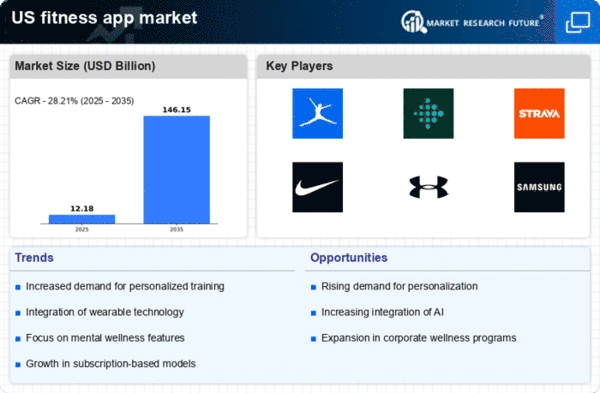The fitness app market is currently characterized by intense competition and rapid innovation, driven by a growing consumer focus on health and wellness. Major players such as MyFitnessPal (US), Fitbit (US), and Strava (US) are at the forefront, each adopting distinct strategies to enhance their market presence. MyFitnessPal (US) emphasizes user engagement through personalized nutrition tracking and community features, while Fitbit (US) leverages its hardware ecosystem to integrate fitness tracking with health monitoring. Strava (US), on the other hand, focuses on building a robust social platform for athletes, fostering community interaction and competition, which appears to resonate well with its user base. Collectively, these strategies contribute to a dynamic competitive environment, where innovation and user experience are paramount.
In terms of business tactics, companies are increasingly localizing their offerings to cater to regional preferences, optimizing supply chains to enhance efficiency, and investing in digital transformation initiatives. The market structure is moderately fragmented, with a mix of established brands and emerging players vying for consumer attention. The collective influence of key players shapes market dynamics, as they continuously adapt to evolving consumer demands and technological advancements.
In October 2025, MyFitnessPal (US) announced a partnership with a leading health insurance provider to offer premium users personalized health coaching services. This strategic move not only enhances the app's value proposition but also positions MyFitnessPal (US) as a holistic health management tool, potentially attracting a broader audience seeking comprehensive wellness solutions. The integration of health coaching aligns with the growing trend of personalized health services, indicating a shift towards more integrated health management approaches.
In September 2025, Fitbit (US) launched a new feature that utilizes AI to provide users with tailored workout recommendations based on their activity history and fitness goals. This innovation underscores Fitbit's (US) commitment to leveraging technology to enhance user experience and engagement. By incorporating AI, Fitbit (US) not only differentiates itself in a crowded market but also addresses the increasing consumer demand for personalized fitness solutions, which could lead to higher user retention rates.
In August 2025, Strava (US) expanded its platform by introducing a subscription model that offers exclusive content and advanced analytics for serious athletes. This strategic pivot aims to monetize its user base more effectively while providing enhanced value to dedicated users. The subscription model reflects a broader trend in the fitness app market, where companies are exploring diverse revenue streams to sustain growth and profitability.
As of November 2025, the fitness app market is witnessing trends such as digitalization, sustainability, and AI integration, which are reshaping competitive dynamics. Strategic alliances are becoming increasingly prevalent, as companies recognize the value of collaboration in enhancing their offerings. Looking ahead, competitive differentiation is likely to evolve from traditional price-based competition towards a focus on innovation, technology, and supply chain reliability. This shift suggests that companies that prioritize unique value propositions and technological advancements will be better positioned to thrive in an increasingly competitive landscape.


























Leave a Comment